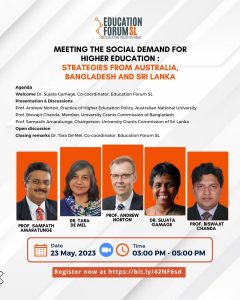එදා බැරි වුනු අධ්යාපන ප්රතිසංස්කරණ අද කරන්න පුළුවන් ඇයි? : 2023-2033 ජාතික අධ්යාපන ප්රතිපත්ති රාමුව පිළිබඳ විශ්ලේෂණයක් by Sujata Gamage 2023 ජූලි මාසයේදී කැබිනට් මණ්ඩලය විසින් ජාතික අධ්යාපන ප්රතිපත්ති රාමුවක් සැකසීම සඳහා ජනාධිපතිවරයාගේ සභාපතිත්වයෙන් පත් කෙරුණු කැබිනට් අනු කමිටුව විසින් අද වන විට එම ජාතික අධ්යාපන ප්රතිපත්ති රාමුව 2023-2033 (හෝ National Education Policy Framework 2023-2033) අධ්යාපනය පිළිබඳ ආංශික අධීක්ෂණ කමිටුවේ හා දෙවනුව සමස්ත පාර්ලිමේන්තුවේ විමර්ශනය සඳහා ඉදිරිපත් කොට ඇත. මෙම ලිපියේ අරමුණ එම ප්රතිපත්ති රාමුවේ සුවිශේෂ අංගයන් ලෙස මා දකින- (1) ව්යුහාත්මක වෙනස්කම් වලට අවධානය දීම (2) දැනටමත් එම ප්රතිසංස්කරණ සඳහා රාජ්ය ආයතන විසින් සුළු හෝ වැඩි ලෙස ක්රියාත්මක වෙමින් සිටීම, හා (3) අද පවතින සමාජ ආර්ථික වටපිටාව යන — කාරණා නිසා එදා බැරි වුනු අධ්යාපන ප්රතිසංස්කරණ අද කරන්න පුළුවන් වේ යන මතය ඉදිරිපත් කිරීමයි. එදා බැරි වුනු අධ්යාපන ප්රතිසංස්කරණ ලෙස මා අදහස් කරන්නේ 1943 අධ්යාපනය පිලිබඳ විශේෂ කාරක සභාවේ වාර්තාව මත පදනම්වූ ප්රතිසංස්කරණ හා ඊට පසුව කෙරුණු ප්රතිසංස්කරණයන්ය. එයින් මෑතකදී කෙරුණු වැදගත්ම ප්රතිසංස්කරණය වන්නේ 1997 ජනාධිපති කාර්ය සාධක බලකායක් මගින් සාමාන්ය අධ්යාපනයේ ප්රතිසංස්කරණ පිළිබඳව නිකුත් කරන ලද වාර්තාවක් පදනම්ව එවකට ජනාධිපති චන්ද්රිකා බණ්ඩාරනායක කුමාරතුංග මහත්මියගේ පූර්ණ කැපවීම ඇතිව මූලිකවම ප්රාථමික විෂය මාලාව හා ඉගෙනුම් ඉගැන්වීම් ක්රියාවලියේ ගැඹුරු වෙනස්කම්ය.
[Extracted from the report “A Strategic Plan for the Department of Examination” Prepared by Committee of Experts for Reforming the Department of Examination appointed by the Minister for Education dated December 2017.] The Department of Examination is perhaps the government department with the most impact on society in Sri Lanka. Families organize their lives around the schedules of the three national examinations. Success at these examinations is seen as the major avenue of social mobility, but the exam-centered nature of the education system is also widely seen as the root cause of problems of education in Sri Lanka. This observation is reiterated in all three key reports on the examination system and/or general education published recently (MoE, 2009; NEC, 2014 and NEC, 2016).
Download Plan : Sinhala English A Strategic Plan for the Department of Examination for implementation in 2018-2019 was prepared by Committee of Experts to review examinations and evaluation system and roles and functions of the Department of Examinations to make recommendations for improving the quality and standards of testing and evaluation systems in Sri Lanka appointed by the Secretary for Education by letter dated April 28, 2017. Members of the Committee Ex-officio: Mr. S.U.Wijerathne (Chair) and Mr.

May 23, 2023 FULL VIDEO: https://youtu.be/P9FLkGE9Rgg PANEL: Prof. Andrew Norton, Professor in the Practice of Higher Education Policy, Australian National University, Higher education student charges and income contingent loans in Australia Prof. Biswajit Chanda, Member, UGC, Bangladesh, Meeting the social demand for higher education: A Bangladesh perspective Prof. Sampath Amaratunge, Chairman, UGC, Sri Lanka, Current higher education system in Sri Lanka and recommendations for its expansion (00:45:30-1:13:00 on video) QUOTE of the day: A public sector supply that is free or very cheap, and hence constrained in quantity and quality, leads to greater use of private institutions than in most OECD countries and extensive study abroad.

වසංගතයෙන් පසු අධ්යාපනය | பிளேக்கிற்குப் பிறகு கல்வி A policy dialogue on “ Education Post-Pandemic”‘ was held by the Education Forum Sri Lanka (EFSL) on 26th March 2022, via Zoom. Watch the Policy Dialogue: Video PRESENTATIONS Transforming Education for All Post COVID-19 – Ms. Takaho Fukami, Chief of Education, UNESCO Survey on the Impact of Covid-19 on Education in Sri Lanka – Ms. Gayani Hurulle, Senior Research Manager, LIRNEasia DISCUSSION With designated responses from: – Mr. Harshana Perera, Asian International School, Colombo – Ms.
Press Release #14: Open letter to Derana TV on the Responsibility of the media for Social Cohesion | සමාජ සංහිදියාව පිළිබඳ මාධ්ය වගකීම මතක් කරමින් අද දෙරණ TV වෙත විවෘත ලිපියක් The government is poised to launch major reforms in education. One of the key objectives is to impart social-emotional learning and cultural skills to our children so that co-existence and lasting cohesion will be a reality in Sri Lanka as per our national objectives of education. Children spend only six hours per day in school for a limited number of days in a year. The society in which they live shapes their values as much as education, or more so. Popular media too plays a critical role.
EFSL Press Release #13: Let’s resolve to keep our children engaged in learning in 2022 | EFSL මාධ්ය ප්රකාශන #13: එළඹුනු 2022 වසරේ අපේ දරුවන් නොනවත්වා අධ්යාපනයේ රඳවා ගැනීමට අධිෂ්ඨානය කර ගනිමු. January 1, 2022 Greetings for 2022 and thank you for staying with us during the last two years when the forum earnestly engaged in its core mission of catalyzing policy reforms in education. The onset of the pandemic in March 2020 shaped our work. We carried out nineteen policy dialogues during that period and shared our findings through press releases. We looked at curricular reform, examinations, education funding, but the focus has been on keeping the school open during the pandemic.
The urgency of getting children back to school at the first opportunity is accepted worldwide, but Covid-19 has also brought three other issues to the fore internationally – (1) Ethics of conducting competitive examinations when significant portions of the students have been left out of education (2) Wisdom of continuing same old education when a full return to normalcy is not in sight (3) The need for combining face-2-face and distance mode of teaching and learning as the new normal. Meanwhile here in Sri Lanka, our Ministry of Education goes about as if it is business as usual. Dates for exams are scheduled, postponed, and rescheduled. There seems to be no intention of seeking alternatives to the “covering the syllabus to prepare children for exams” approach to education. While we appreciate the government’s initiatives in the health front to reopen schools, we cannot be happy about the pedagogical aspects.
Teachers deserve respect and recognition | ගුරුවරුන්ට හිමි ගෞරවය හා පිළිගැනීම වහාම ලබා දෙන්න Press Release, July 22, 2021 (Please scroll down for Sinhala and Tamil versions | සිංහල හා දෙමළ නිවේදන සඳහා පහලට යන්න) We are dismayed to see that the teachers and principals had to launch a strike at this difficult time, but their grievances are understandable. Whilst we endorse their claim for higher wages, what we we wish to highlight here is the lack of trust and respect shown towards our teachers by authorities. The latest is a news item which said that the Ministry has established a program which calls on teachers and principals to issue weekly reports after evaluating students and appoints education instructors to supervise teacher performance on a regular basis. This kind of scrutiny on teachers is totally unnecessary and unacceptable. Teachers have been reaching out to students on their own since March 2020 without being recognized, rewarded or guided by the authorities.
July 1, 2021 HE the President, Gotabhaya Rajapakse Hon Prime Minister, Mahinda Rajapakse MP] Hon Minister of Education, Prof GL Peiris MP Hon Leader of the Opposition, Sajith Premadasa MP Members of the Ministerial Consultative Committee on Education Covid Education Crisis We write to draw your attention to the serious situation faced by the 4.3 million student population in this country since March 2020 when the pandemic first appeared. There has not been any education for them in the last 15 months except for a few weeks when schools opened briefly, and a façade of online education received by a few at other times. We have listed below some of the grave consequences of long-term school closures: Due to an undue reliance on online education, more than half the children are left out of contact with their schools. Left without guidance, teachers have adopted social media such as WhatsApp to send out notes and assignments connecting with whoever they could, even though the Census Department reported in 2019 that only 29% of the population accessed the Internet.
 May 23, 2023 FULL VIDEO: https://youtu.be/P9FLkGE9Rgg PANEL: Prof. Andrew Norton, Professor in the Practice of Higher Education Policy, Australian National University, Higher education student charges and income contingent loans in Australia Prof. Biswajit Chanda, Member, UGC, Bangladesh, Meeting the social demand for higher education: A Bangladesh perspective Prof. Sampath Amaratunge, Chairman, UGC, Sri Lanka, Current higher education system in Sri Lanka and recommendations for its expansion (00:45:30-1:13:00 on video) QUOTE of the day: A public sector supply that is free or very cheap, and hence constrained in quantity and quality, leads to greater use of private institutions than in most OECD countries and extensive study abroad.
May 23, 2023 FULL VIDEO: https://youtu.be/P9FLkGE9Rgg PANEL: Prof. Andrew Norton, Professor in the Practice of Higher Education Policy, Australian National University, Higher education student charges and income contingent loans in Australia Prof. Biswajit Chanda, Member, UGC, Bangladesh, Meeting the social demand for higher education: A Bangladesh perspective Prof. Sampath Amaratunge, Chairman, UGC, Sri Lanka, Current higher education system in Sri Lanka and recommendations for its expansion (00:45:30-1:13:00 on video) QUOTE of the day: A public sector supply that is free or very cheap, and hence constrained in quantity and quality, leads to greater use of private institutions than in most OECD countries and extensive study abroad.  වසංගතයෙන් පසු අධ්යාපනය | பிளேக்கிற்குப் பிறகு கல்வி A policy dialogue on “ Education Post-Pandemic”‘ was held by the Education Forum Sri Lanka (EFSL) on 26th March 2022, via Zoom. Watch the Policy Dialogue: Video PRESENTATIONS Transforming Education for All Post COVID-19 – Ms. Takaho Fukami, Chief of Education, UNESCO Survey on the Impact of Covid-19 on Education in Sri Lanka – Ms. Gayani Hurulle, Senior Research Manager, LIRNEasia DISCUSSION With designated responses from: – Mr. Harshana Perera, Asian International School, Colombo – Ms.
වසංගතයෙන් පසු අධ්යාපනය | பிளேக்கிற்குப் பிறகு கல்வி A policy dialogue on “ Education Post-Pandemic”‘ was held by the Education Forum Sri Lanka (EFSL) on 26th March 2022, via Zoom. Watch the Policy Dialogue: Video PRESENTATIONS Transforming Education for All Post COVID-19 – Ms. Takaho Fukami, Chief of Education, UNESCO Survey on the Impact of Covid-19 on Education in Sri Lanka – Ms. Gayani Hurulle, Senior Research Manager, LIRNEasia DISCUSSION With designated responses from: – Mr. Harshana Perera, Asian International School, Colombo – Ms. 